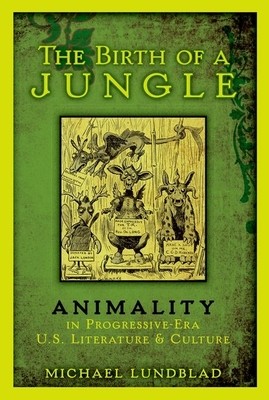
- We will send in 10–14 business days.
- Author: Michael Lundblad
- Publisher: Oxford University Press, USA
- ISBN-10: 0190231580
- ISBN-13: 9780190231583
- Format: 15.5 x 23.1 x 2 cm, softcover
- Language: English
- SAVE -10% with code: EXTRA
Reviews
Description
According to the law of the jungle, the behavior of wild animals can be equated with natural human instincts not only for competition and reproduction, but also for violence and exploitation. Drawing on numerous novels and cultural events at the turn of the twentieth century, The Birth of a Jungle examines how the characteristics and imagery of wild animals were evoked to explore a wide range of human behaviors, including homosexuality, labor exploitation, and the lynching of African Americans.
Throughout the study, Michael Lundblad emphasizes what he terms "the discourse of the jungle" Darwinist-Freudian constructions of "the human" and "the animal" that redefined various behaviors in relation to animal instincts. With nuanced, attentive readings, Lundblad reveals how these formulations of the human animal, despite reigning critical interpretations, were often contested rather than reinforced in Progressive-Era texts. Henry James's "The Beast in the Jungle" and fiction by Jack London serve as opportunities to examine changing attitudes toward sexuality and queer desire. Works like Andrew Carnegie's The Gospel of Wealth and Frank Norris's The Octopus offer insights into another type of jungle: the capitalist marketplace. The real-life electrocution of a circus elephant at Coney Island and Upton Sinclair's muckraking classic, The Jungle, inform the subsequent discussion of animalized class warfare. Understandings of race and evolution are explored through the work of WilliamJames, Edgar Rice Burrough's Tarzan of the Apes, and the role of William Jennings Bryan at the Scopes "Monkey Trial" of 1925. Engagingly written and cogently argued, The Birth of a Jungle reveals the significance of animality in relation to the history of sexuality, literary naturalism, and critical race studies, while highlighting how the discourse of the jungle remains a disturbing yet powerful presence in today's culture.
EXTRA 10 % discount with code: EXTRA
The promotion ends in 16d.11:59:55
The discount code is valid when purchasing from 10 €. Discounts do not stack.
- Author: Michael Lundblad
- Publisher: Oxford University Press, USA
- ISBN-10: 0190231580
- ISBN-13: 9780190231583
- Format: 15.5 x 23.1 x 2 cm, softcover
- Language: English English
According to the law of the jungle, the behavior of wild animals can be equated with natural human instincts not only for competition and reproduction, but also for violence and exploitation. Drawing on numerous novels and cultural events at the turn of the twentieth century, The Birth of a Jungle examines how the characteristics and imagery of wild animals were evoked to explore a wide range of human behaviors, including homosexuality, labor exploitation, and the lynching of African Americans.
Throughout the study, Michael Lundblad emphasizes what he terms "the discourse of the jungle" Darwinist-Freudian constructions of "the human" and "the animal" that redefined various behaviors in relation to animal instincts. With nuanced, attentive readings, Lundblad reveals how these formulations of the human animal, despite reigning critical interpretations, were often contested rather than reinforced in Progressive-Era texts. Henry James's "The Beast in the Jungle" and fiction by Jack London serve as opportunities to examine changing attitudes toward sexuality and queer desire. Works like Andrew Carnegie's The Gospel of Wealth and Frank Norris's The Octopus offer insights into another type of jungle: the capitalist marketplace. The real-life electrocution of a circus elephant at Coney Island and Upton Sinclair's muckraking classic, The Jungle, inform the subsequent discussion of animalized class warfare. Understandings of race and evolution are explored through the work of WilliamJames, Edgar Rice Burrough's Tarzan of the Apes, and the role of William Jennings Bryan at the Scopes "Monkey Trial" of 1925. Engagingly written and cogently argued, The Birth of a Jungle reveals the significance of animality in relation to the history of sexuality, literary naturalism, and critical race studies, while highlighting how the discourse of the jungle remains a disturbing yet powerful presence in today's culture.


Reviews